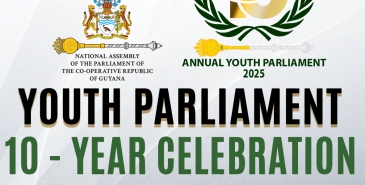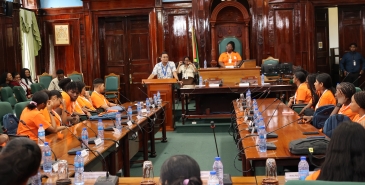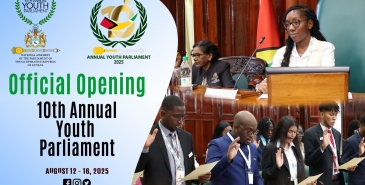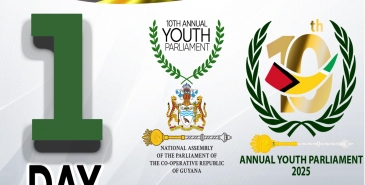Limit On Amount Outstanding Under Guarantees Given Under The Guarantee Of Loans (Public Corporations And Companies) Act
Speech delivered at: 60thSitting - Tenth Parliament - 18 July, 2013
18 July, 2013
5731
LIMIT ON AMOUNT OUTSTANDING UNDER GUARANTEES GIVEN UNDER THE GUARANTEE OF LOANS (PUBLIC CORPORATIONS AND COMPANIES) ACT
Minister of Housing and Water [Mr. Ali]: Mr. Speaker, it gives me great privilege to speak on this very important motion that is before the House tonight. Tonight gives us an excellent opportunity to separate selfish motivation from nationalistic thinking. It gives us an excellent opportunity to review the context in which the Hydroelectric Project was discussed in the Republic of Guyana.
During the 1973 election campaign, Prime Minister Forbes Burnham announced that his administration intended to develop a large hydroelectric complex in the Upper Mazaruni River, aimed at powering an aluminium plant. At that time, Guyana was spending more than 25% of its Gross Domestic Product (GDP) on fuel imports. At that time also, there was a lot of opposition from the Akawaios. Prime Minister Burnham, in responding to that opposition, had this to say:
“In response to this opposition, the Government tried as much as possible to allay the fears of the local residents by explaining the economic benefits that would become available to them with the construction of the hydroelectric project.”
In 1979, Prime Minister Burnham, addressing a large crowd at a time when the workers were going through severe hardship and they were demanding a decent wage and at a time when 80% of the economy was under state control, had a famous speech in which he said, “Do you want hydro at $14?” The orchestrated chorus that formed the crowd said, “Hydro, Comrade Leader!” The then Prime Minister announced that we will proceed with hydro and forgo the $14 that the workers so deserved. It is a good opportunity for us to review the historical context of hydropower.
In 1981, after the border controversy erupted with Venezuela, surrounding the hydro project, Burnham was very surprised by this Venezuelan action. At a press conference on 8 April 1981, he stated that it was the first time Venezuela was expressing opposition to the Upper Mazaruni Hydroelectric Project. He said the discussions in Venezuela were generally frank, cordial and open and ‘we sought to examine how economic and other forms of cooperation could be carried forward especially on the question of the Upper Mazaruni Hydroelectric Project.
Let us go on. Mr. Speaker, if you really want to learn, you will pay attention.
Mr. Speaker: Are you addressing me that way, Mr. Ali? Be careful. What is your source though? I think you need to give a source. I see an Apple Computer. That cannot be your source.
Mr. Ali: I am reading from www.guyana.org/features/postindependence/chapter17.html.
Mr. Speaker: Who is it authored by?
Mr. Ali: It is authored by Dr. Odeen Ishmael. We now come to the issue of international financial institutions. The Venezuelan Government at that time wrote the World Bank, objecting to the project. They said in that letter:
“The construction of the dam over the Upper Mazaruni encompasses considerable works which would alter deeply and irreversibly the region and the physical milieu. Venezuela ratifies its firm opposition to have such a unilateral action of disposition taken in a territory over which it has sovereignty… The opposition of Venezuela is so much firmer as it is quite clear that the political purpose pursued by Guyana with the Upper Mazaruni Project, the priority of which is far from proven and with an economic feasibility, in the denied assumption that it was ever built, which would depend on the acquisition of electric power by Venezuela…”
In response to this, the late Desmond Hoyte who was then Guyana’s Vice President for Economic Planning and Finance had this to say:
“It is not within the competence of the Government of Venezuela to decide on or dictate the development priorities of Guyana; nor has the Government of Guyana found any provision in the Bank's charter that requires the Bank to satisfy the Government of Venezuela about the development priorities of a member country before it participates in a project in that country. Moreover, it is manifest absurdity for the Government of Venezuela to suggest that the Bank would become involved in the financing of a project without first establishing its feasibility. Further on this point, I would merely add that the Venezuelan Foreign Minister is under a misconception when he asserts that the feasibility of the project depends on the purchase of electricity by Venezuela. This statement is completely divorced from fact. The project has been independently assessed by the World Bank, among others, as being technically and economically feasible…”
It has been assessed since then as technically and financially feasible. This is not the PPP Government speaking.
“…in circumstances which do not involve or require Venezuelan participation in any shape or form... In the circumstances, the Government of Guyana interprets the communication of the 8th June, 1981, as an undisguised attempt by the Venezuelan Government to manipulate the Bank and use it as an instrument for achieving its ulterior political ends...”
Hon. Speaker, today it is not Venezuela with the ulterior motive. Today it is not Venezuela with the ulterior motive of derailing development. [Dr. Singh: Who is it?] It is ourselves in the form of the Opposition that is causing this harm and destruction to a project that was conceptualised since then!
Mr. Speaker, tonight we are committing a serious injustice to the sacrifices of the leaders of the past of this country and we ought to be ashamed of ourselves!
I am even more perturbed at the fact that the Opposition would refuse to speak on these matters. Even if you oppose these important national matters, you have a political responsibility to tell the people your reasons for opposing them. You have a responsibility to the electorates; you have to respect the electorates; you have to respect the people of this country. And if you do not respect the people, then you will take the position that the Opposition is taking tonight.
It is clear that the Opposition understands the economic benefit that would be derived from this project and it is hurtful to know that a project that had such political support...and if you go back to the political history, you would know that some of these projects came under the general slogan of critical support. The Opposition, in those days, though they felt the hard side of the blade and so many injustices were brought against them - rigged elections, undemocratic rule - was still responsible to understand that in matters of national interest, in matters of national commitment and in matters where the people must take priority, we had to give critical support.
The motion to amend the debt ceiling is an important project in the whole context of the Hydroelectric Project. It is important to note that raising the ceiling is not the same as guaranteeing any debt by GPL. I have heard this in the public arena and I want to make this point very clear: raising the ceiling is not the same as guaranteeing any debt to GPL. On the contrary, it will only serve to expand the options available to access concessional financing from lending agencies.
The Hon. Minister of Finance already made the point that in 1980, we had a movement of $500 million to $1 billion and he also elaborated that if you use the US dollar exchange rate from 1980, it would have been a guaranteed equivalent to US$400 million at that time. If you use the same yardstick and adjust for US inflation from 1980 to 2013, the figure would be US$1.1 billion. We are not seeking to take the ceiling to the full adjustment; we are seeking to take the adjustment to US$750 million.
The Hon. Minister also explained that in making an assessment on the viability and prudence in decisions like these, we measure it against economic indicators. The $1 billion guarantee, for example, set in 1980 was approximately 73.2% of GDP at factor cost. The guarantee proposed today is only approximately 27% of projected GDP. So the guarantee set in 1980 was 73.2% of GDP at factor cost. The guarantee that we are proposing today would be 27% of projected GDP for 2013. Based on projected nominal GDP by International Monetary Fund (IMF) ratio of public guarantee debt to GDP is likely to improve further. So raising the ceiling...it is even likely that our ratio to GDP would improve, for example, in 2015, it is projected to be 20.8%. In 2020, it is projected to be 14.4%. In 2025, it is projected to be 9.9% and, in 2030, it is projected to be 7.1%.
If we fail to provide the guarantee today, this will place the Amelia Falls Hydroelectric Project in a precarious position and almost certain termination after hundreds of man-hours and billions of dollars. Our country has indeed gone on this route before, saddled with the US dollar millions of debt for a project that had to be abandoned for unfortunate reasons. This project is unquestionably important for improving the country’s competitiveness as it is expected to substantially reduce the cost of and improve the reliability of the electricity supply. Moreover, by placing this catalytic project at risk, we may deprive the country of other significant social and economic benefits, benefits that are well documented.
I wish to turn to IMF Article IV Surveillance Report 2010. This Report reported on the Amaila Falls Hydroelectric Project and its expected yield of benefits. This is what the IMF Report had to say:
“This project will save consumers approximately US$3.5 billion over twenty years through the reduction of tariffs for residential, commercial and industrial customers.”
So a vote against this project tonight, according to the IMF Report, is denying the people of this country of a saving US$3.5 billion over the next 20 years. I will be bold enough to say that the political Opposition must take full responsibility for the denial of this saving to the people of Guyana. There shall be no mincing of words! They must take full responsibility for their actions!
The second benefit that the Report alluded to is that it will reduce the fuel import bill by approximately 20% to 25%, which will save the country over US$90 million on fuel import bill. A vote against this project tonight is denying Guyana of US$90 million saving that can be used on health, education, housing, water and an increase in old age pension that we have championed from this side.
Another benefit of this project is that it will allow for the generation of electricity using 100% renewable resources. This has the potential of earning approximately US$10 million annually from the sale of carbon credit. So you will also be denying Guyana the ability to earn another US$10 million annually from the sale of carbon credit when you vote against this project. They do not understand that the project is captured in the Bill.
If you look at the AFC Action Plan, too, the second edition...I am not talking here about the ‘after funeral ceremony’; I am talking about the political party AFC. The after funeral ceremony will come when they kill the Hydroelectric Project here and will have to go back out there to explain to the people your action, then we will see how that ceremony will play out itself. In that second edition Action Plan, the AFC spoke about structural transformation and about making manufacturing and agro-processing activities feasible. How can you make manufacturing and agro-processing feasible if you cannot bring down the cost of energy, the cost of power, which is the predominant cost in the manufacturing and agro-processing sector? What this proves to us is that these were mere words on paper for them. It meant nothing for the AFC. The AFC had no intention of implementing this strategy. They were basically using slogans and words to sway the electorates which they had no meaning or commitment to. At least this Government has stayed committed to every single manifesto promise that we have made to the people. We have not shied away from a single one of our manifestoes promises. And guess what? Our manifesto promise is for every Guyanese from every walk of life.
I wish now to look at two assumptions and these assumptions are based on the existing demand. Scenario one assumes a 20% reduction in tariff. Under the current consumption level, with a 20% reduction in tariff, residential consumers would save approximately $208.7 million monthly or $2.5 billion annually. Commercial consumers, tariff B and C would save $91.3 million monthly or $1.1 billion annually. Industrial consumers, tariff D responsible for structural transformation will save $84.1 monthly or $1 billion annually. The most significant beneficiary would be residential consumers, low income earners, public servants and farmers who will save $2.5 billion annually. This translates to $2.5 billion in disposable income for residential consumers. Voting against this project is taking away that $2.5 billion of disposable income from the ordinary people of this country.
Let us look at scenario two. With a 40% reduction in tariff, the savings in every category will double. For example, residential consumers would save approximately $417.4 million monthly or $5 billion annually. Industrial consumers would save $84.1 million monthly or $2 billion annually. The more significant beneficiary would be residential consumers, low income earners, public servants, with a saving of $5 billion and having $5 billion more of disposable income to spend and contribute to economic upliftment.
I do not know what the Hon. Members want me to tell the IDB but what I want to tell the Hon. Members, what I want to tell all of Guyana tonight, is that the People’s Progressive Party/Civic Government is supportive of a project that would bring over $5 billion of cost saving to the ordinary Guyanese. What I want to tell the people out there is that the People’s Progressive Party/Civic Government is supportive of a project that would expand the manufacturing and agro-processing industry of Guyana. And what I want to tell the people of Guyana is that the Opposition has no interest in the development of this country; the Opposition has no interest in the modernisation of this country and, finally, the day shall come when all of us shall account for our deeds, whether the deeds be good in nature, whether the deeds be bad in nature, whether the deeds be selfish in nature, whether the deeds be vindictive in nature, the accountability process will take place and the judgement shall be passed. And I can assure you, we on the Government side will be on the right side of that judgement.
Thank you very much. [Applause]
Speech delivered by:
What's New

17 August, 2025
10th Annual Youth Parliament Closes: Celebrating a Decade of Impact, Excellence, and Youth Empowerment10th Annual Youth Parliament Closes: Celebrating a Decade of Impact, Excellence, and Youth Empower

13 August, 2025
Youth Parliamentarians Assemble for Grand Rehearsals for the 10th Annual Youth Parliament

12 August, 2025
10th Annual Youth Parliament Kicks Off – Young Voices, Bold Ideas, Bright Futures!

11 August, 2025
10th Annual Parliament Kicks off tomorrow

